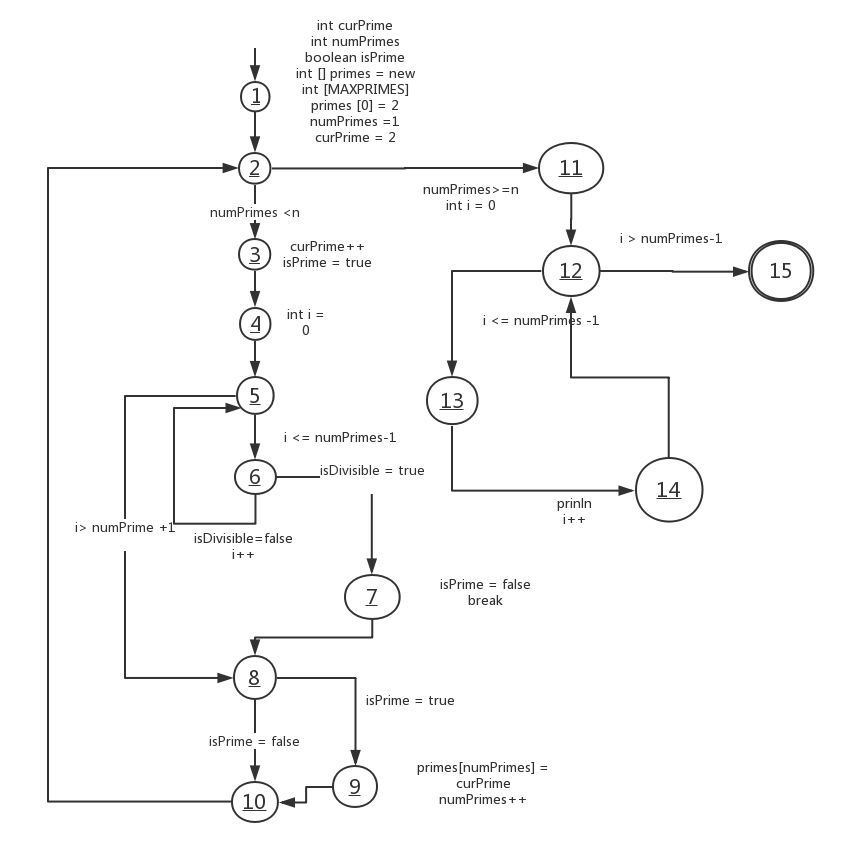软件测试第三次作业
/** ***************************************************** * Finds and prints n prime integers * Jeff Offutt, Spring 2003 ********************************************************* */ private static void printPrimes (int n) { int curPrime; // Value currently considered for primeness int numPrimes; // Number of primes found so far. boolean isPrime; // Is curPrime prime? int [] primes = new int [MAXPRIMES]; // The list of prime numbers. // Initialize 2 into the list of primes. primes [0] = 2; numPrimes = 1; curPrime = 2; while (numPrimes < n) { curPrime++; // next number to consider ... isPrime = true; for (int i = 0; i <= numPrimes-1; i++) { // for each previous prime. if (isDivisible (primes[i], curPrime)) { // Found a divisor, curPrime is not prime. isPrime = false; break; // out of loop through primes. } } if (isPrime) { // save it! primes[numPrimes] = curPrime; numPrimes++; } } // End while // Print all the primes out. for (int i = 0; i <= numPrimes-1; i++) { System.out.println ("Prime: " + primes[i]); } } // end printPrimes
(a).Draw the control flow gragh for the printPrime() method

(b) Consider test cases t1 = (n = 3) and t2 = ( n = 5). Although these tour the same prime paths in printPrime(), they don't necessarily find
the same faults. Design a simple fault that t2 would be more likely to discover than t1 would.
当maxPrimes设置为4时,t2会越界
(c) For printPrime(), find a test case such that the corresponding test path visits the edge that connects the beginning of the while statement
to the for statement without going through the body of the while loop.
当 n = 1 时 符合条件
(d) Enumerate the test requirements for node coverage, edge coverage,and prime path coverage for the path for printPrimes().
点覆盖:{ 1,2,3,4,5,6,7,8,9,10,11,12,13,14,15}
边覆盖:{(1,2)(2,3)(3,4)(4,5)(5,6)(5,8)(6,5)(6,7)(7,8)(8,9)(8,10)(10,2)(2,11)(11,12)(12,13)(13,14)(14,12)(12,15)
主路径覆盖:
(1,2,3,4,5,6,7,8,9,10)
(1,2,3,4,5,6,7,8,10)
(1,2,3,4,5,8,9,10)
(1,2,3,4,5,8,10)
(1,2,11,12,15)
(1,2,11,12,13,14)
(2,3,4,5,6,7,8,9,10,2)
(2,3,4,5,6,7,8,10,2)
(2,3,4,5,8,9,10,2)
(2,3,4,5,8,10,2)
(3,4,5,6,7,8,9,10,2,3)
(3,4,5,6,7,8,10,2,3)
(3,4,5,8,9,10,2,3)
(3,4,5,8,10,2,3)
(3,4,5,6,7,8,9,10,2,11,12,13,14)
(3,4,5,6,7,8,9,10,2,11,12,15)
(4,5,6,7,8,9,10,2,3,4)
(4,5,6,7,8,9,10,2,11,12,13,14)
(4,5,6,7,8,9,10,2,11,12,15)
(5,6,5)
(5,6,7,8,9,10,2,3,4,5)
(5,6,7,8,10,2,3,4,5)
(6,5,6)
(6,7,8,9,10,2,3,4,5,6)
(7,8,9,10,2,3,4,5,6,7)
(7,8,10,2,3,4,5,6,7)
(8,9,10,2,3,4,5,6,7,8)
(9,10,2,3,4,5,6,7,8,9)
(10,2,3,4,5,6,7,8,9,10)
(10,2,3,4,5,6,7,8,10)
(12,13,14,12)
基于junit实现一个主路径覆盖的测试
public class hw3 { public static void printPrimes (int n) { int curPrime; // Value currently considered for primeness int numPrimes; // Number of primes found so far. boolean isPrime; // Is curPrime prime? int MAXPRIMES = 10; int [] primes = new int [MAXPRIMES]; // The list of prime numbers. // Initialize 2 into the list of primes. primes [0] = 2; numPrimes = 1; curPrime = 2; while (numPrimes < n) { curPrime++; // next number to consider ... isPrime = true; for (int i = 0; i <= numPrimes-1; i++) { // for each previous prime. if (curPrime%primes[i]==0) //此处原理:所有合数都能被一个小于它的质数整除 { // Found a divisor, curPrime is not prime. isPrime = false; break; // out of loop through primes. } } if (isPrime) { // save it! primes[numPrimes] = curPrime; numPrimes++; } } // End while // Print all the primes out. for (int i = 0; i <= numPrimes-1; i++) { System.out.println ("Prime: " + primes[i]); } } // end printPrimes public static void main(String[] args){ printPrimes(5); } }
输出为:
Prime: 2
Prime: 3
Prime: 5
Prime: 7
Prime: 11

